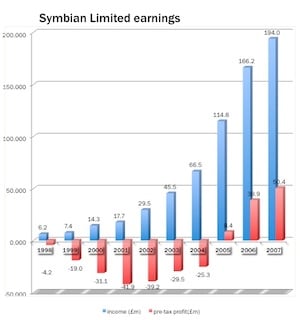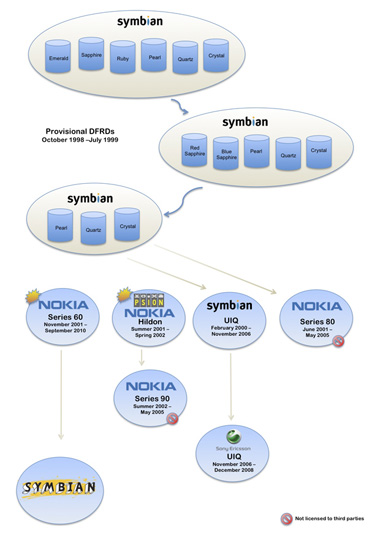This article is more than 1 year old
Blockbuster book lays out the first 20 years of the Smartphone Wars
Symbian's David Wood bares all. Not for the faint hearted
Club Symbian
What comes through is how painfully respectful Symbian was to its partners - how hard it tried to do the right thing. If I had to sum up the Symbian story it would be, "they were always trying to do the right thing for people who were important, but ultimately didn't matter the most". Symbian were visionary and ethical in anticipating the needs of the manufacturers, the networks and the entire industry. But the device owner, the end-user, was removed the Symbian story less three years in, in early 2001. After that, when Symbian withdrew from creating UIs, the company knew what the punter needed, but had lost the power to influence it.
None of this prevented Symbian being a leader for years - although it had taken many painful years to get there. Symbian served a cosy club: in practice, you had to be a huge manufacturer or carrier to make a Symbian phone, as the "crown jewels" of the big phone players were closely guarded secrets - and integrating Symbian was expensive. (This makes the achievement of Sendo - a small British manufacturer that cranked out two Symbian phones - all the more noteable).
For these years, the huge costs of creating Symbian smartphones were largely hidden. Then capitalism intervened.
Things really changed when (as Charles Davies said here) packaged hardware began to appear, allowing newcomers, like Apple, to try their hand.
Apple also set a new standard for user interaction, by targeting a niche: the wealthy consumer, with very lavish phones. I remember Nokians being impressed that the first iPhone had a dedicated GPU - to drive the compositor - and quite flummoxed that the iPhone drew the UI animations at 60 frames per second. Quite unnecessary, the Nokia experts said. (Nokia could have made expensive prestige phones too, Wood points out, but instead targeted volume sales and cut costs, fatally skimping on the hardware).
The Apple effect raised the bar of expectations and Symbian phones couldn't fulfil that demand. Instead, Android did. With the packaged hardware, and higher specs, a much friendlier development environment could be used: Java. And with its clean slate design, Android was a whole world less pain for phone makers to integrate. The Android team could also add new features far quicker than older systems, which Wood describes as having "technological debt". (Future generations pay the bill).
"One of the key reasons Symbian licensees defected in such numbers in subsequent years, from Symbian to Android, is that licensees found it took them much less time and effort to create a smartphone using Android than using Symbian". There were further wrinkles - today, Microsoft makes more from Android via licensing than Google does - but not so many as to make the choice for manufacturers a difficult one.
There was to be no "EasyAPI", and licensees had to wrestle with an API (later called Series 60, or S60) that was hurriedly reverse-engineered from a single phone project, by engineers who'd never written an API before. Nokia management was told by its engineers that it could add Hildon's pen support to its existing S60 APIs in "two weeks" - but it didn't for four years.
Symbian had a decent ride at the top - four years in shipping PDAs, then eleven more years in shipping phones - and what killed it was Android. Java was at last viable on modern hardware, making writing applications much easier. The parsimonious advantage of Symbian no longer counted for as much. And Google offered a turnkey platform - download the code, Wood points out, and two weeks later you had a working prototype phone.
Symbian responded by going open source, a move whose benefits were vastly overrated, Wood concludes, after being one of the key instigators for it.


